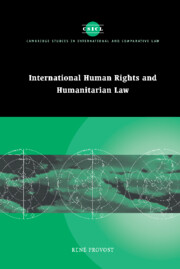Book contents
- Frontmatter
- Contents
- Acknowledgments
- Table of cases
- Table of treaties
- Table of other international instruments
- Introduction
- PART I Normative frameworks
- PART II Reciprocity
- Introduction
- 3 Formation
- 4 Application
- 5 Sanction
- Conclusion to Part II
- PART III Application: law and facts
- General conclusion
- Bibliography
- Index
- CAMBRIDGE STUDIES IN INTERNATIONAL AND COMPARATIVE LAW
Conclusion to Part II
Published online by Cambridge University Press: 07 September 2009
- Frontmatter
- Contents
- Acknowledgments
- Table of cases
- Table of treaties
- Table of other international instruments
- Introduction
- PART I Normative frameworks
- PART II Reciprocity
- Introduction
- 3 Formation
- 4 Application
- 5 Sanction
- Conclusion to Part II
- PART III Application: law and facts
- General conclusion
- Bibliography
- Index
- CAMBRIDGE STUDIES IN INTERNATIONAL AND COMPARATIVE LAW
Summary
The analysis of the role of reciprocity in the development, application and sanction of human rights and humanitarian law paints a complex picture, reciprocity permeating both bodies of law and yet playing out differently in each field. Broad statements that reject reciprocity in human rights law altogether, or that insist on the essentially reciprocal nature of humanitarian law, must be considered unsound. The fact that immediate reciprocity plays a much more prominent role in humanitarian law has a significant impact at every stage of the life of these norms. Greater relevance for immediate reciprocity in humanitarian law goes hand in hand with the bilateralisable character of many humanitarian obligations. Human rights, on the contrary, generate substantive obligations which are almost exclusively non-bilateralisable and which correspond to systemic reciprocity. Despite this fundamental difference, both systems contain norms which, by their nature, are of interest to the international community as a whole. Thus the erga omnes character of human rights obligations has been much discussed, while the consequences of characterising humanitarian law obligations in a similar way requires further attention.
Human rights and humanitarian law have enjoyed tremendous development since the end of the Second World War, and the shifting role of reciprocity stands as witness to their currently unsettled status. In the largely decentralised legal systems that they represent, reciprocity plays an essential role in generating compliance with norms.
- Type
- Chapter
- Information
- International Human Rights and Humanitarian Law , pp. 236 - 238Publisher: Cambridge University PressPrint publication year: 2002

